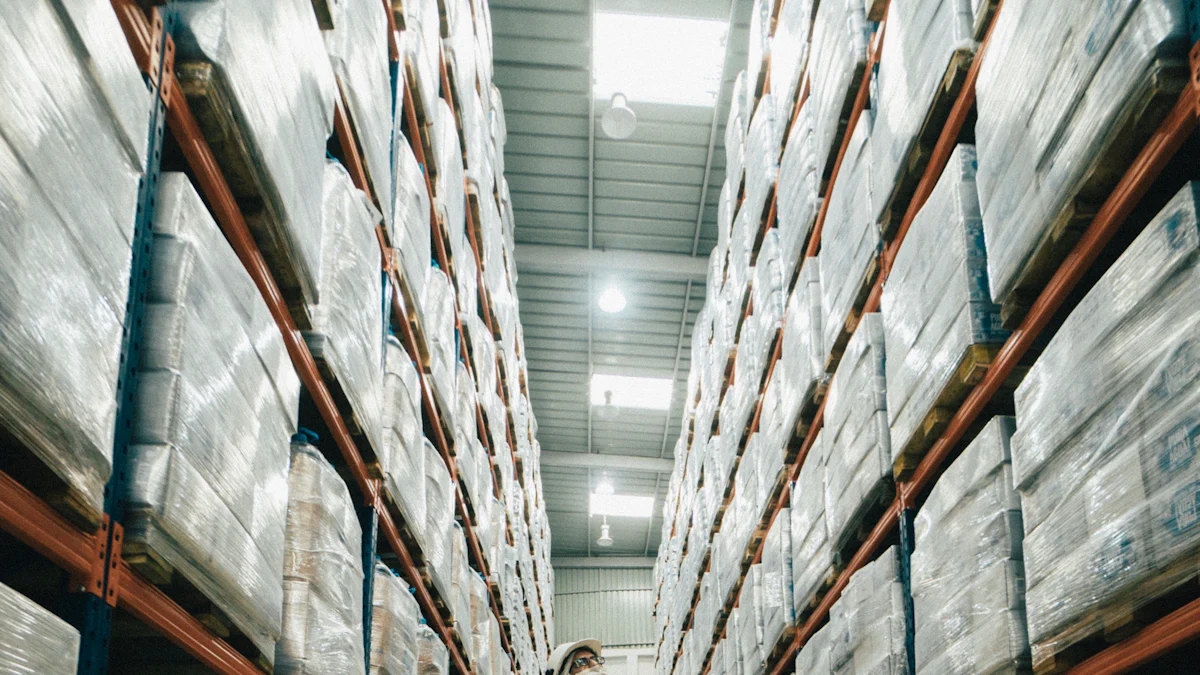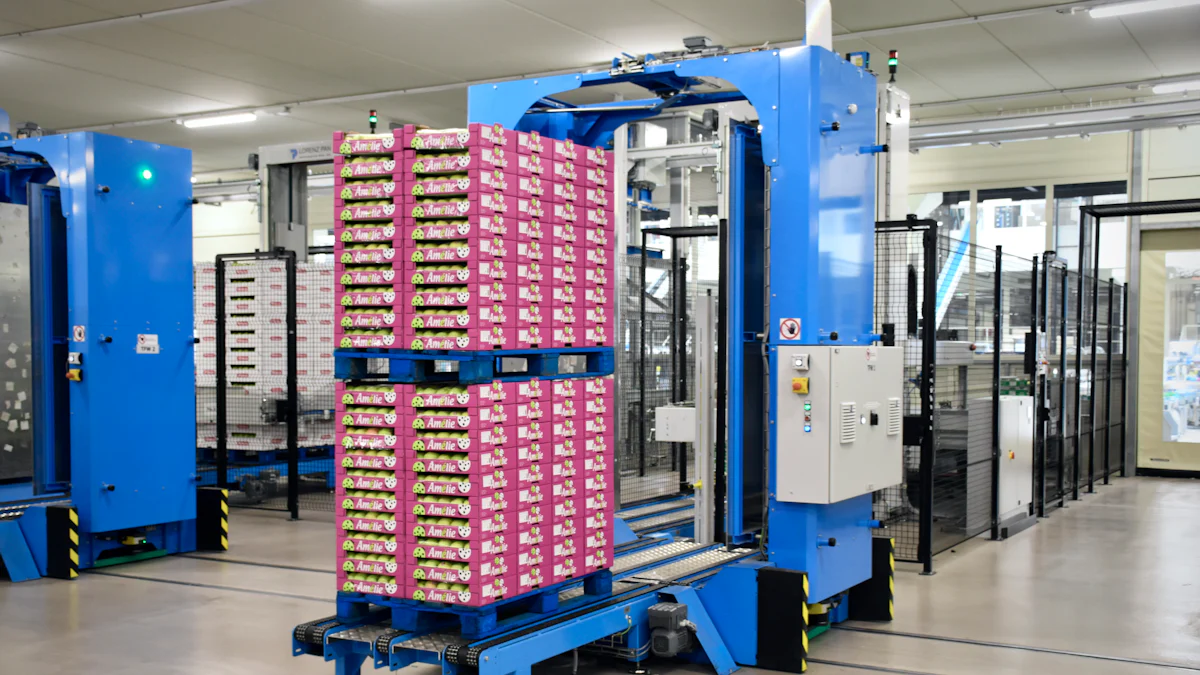A comprehensive guide to warehousing solutions

Warehousing plays a crucial role in supply chain management. Efficient warehousing operations elevate customer experience by providing faster and cheaper shipping. Modern warehouses face challenges such as optimizing resource utilization and minimizing carbon footprints. Sustainable practices help companies reduce their environmental impact and enhance their reputation among consumers. Decision-makers plan to expand warehouse optimization efforts, with 87% targeting improvements by 2024. JUSDA's warehousing solutions offer advanced technologies to meet these demands, ensuring businesses stay competitive.
Understanding Warehousing Solutions
Definition and Importance
What is Warehousing?
Warehousing involves the storage of goods in a designated space until distribution or sale. Companies use warehouses to manage inventory, ensuring products are available when needed. Efficient warehousing operations reduce delays and improve customer satisfaction.
Role of Warehousing in Supply Chain
Warehouses play a pivotal role in supply chain management. They act as hubs for storing, sorting, and distributing products. Effective warehousing reduces transportation costs and enhances delivery speed. Businesses rely on warehouses to maintain inventory levels and meet market demand.
Types of Warehousing Solutions
Public Warehousing
Public warehouses offer storage services to multiple clients on a short-term basis. These facilities provide flexibility and cost savings for businesses with fluctuating storage needs. Public warehouses handle various types of goods, making them suitable for small to medium-sized enterprises.
Private Warehousing
Private warehouses are owned and operated by individual companies for their exclusive use. These facilities offer greater control over inventory management and security. Large corporations often invest in private warehousing to support long-term storage requirements.
Contract Warehousing
Contract warehousing involves third-party providers managing storage operations under a long-term agreement. This solution offers customized services tailored to specific business needs. Contract warehousing combines the benefits of public and private options, providing flexibility with dedicated resources.
Cooperative Warehousing
Cooperative warehousing allows multiple businesses to share storage space and resources. This collaborative approach reduces costs through shared expenses while maintaining high service levels. Cooperative warehouses benefit industries with similar storage requirements, such as agriculture or retail.
"Efficient warehousing solutions streamline supply chains, reduce costs, and enhance customer satisfaction."
JUSDA's Warehousing Solutions
Cloud Warehouse
Features and Benefits
JUSDA's warehousing solutions include the innovative Cloud Warehouse, which leverages cutting-edge technologies to revolutionize traditional warehouse operations. The implementation of AI-driven solutions and robotics enhances operational efficiency. Smart drones improve inventory tracking accuracy and streamline order fulfillment processes. Businesses benefit from superior control, improved security, and transparency through cloud-based architecture. This advanced system supports multi-channel sales, achieving automated warehousing and intelligent transfer via a big data platform.
Certifications and Standards
JUSDA's warehousing solutions adhere to stringent certifications and standards, ensuring reliability and quality. The Cloud Warehouse holds certifications such as TAPA, C-TPAT, and ISO9001. These certifications reflect a commitment to maintaining high safety standards and operational excellence.
Integrated Logistics
Customized Storage and Distribution
JUSDA's warehousing solutions offer customized storage and distribution services tailored to specific business needs. The integrated logistics system excels in home appliance assembly and delivery. This service provides efficient management of over 340,000 SKUs daily, handling between 150,000 to 300,000 orders per day.
E-commerce Integration
The e-commerce integration within JUSDA's warehousing solutions connects seamlessly with mainstream e-commerce platforms' EDI systems. This integration ensures smooth processing of large volumes of orders daily. Businesses benefit from interconnected import/export agency networks at major ports.
Overseas Warehousing
Key Locations
JUSDA's warehousing solutions include strategically located overseas warehouses that provide professional delivery solutions for various products. Key locations encompass the Bohemia warehouse on the US East Coast, the Rancho Cucamonga warehouse on the US West Coast, and the Houston warehouse covering Midwest and South US delivery areas.
Inbound and Outbound Operations
Efficient inbound and outbound operations characterize JUSDA's warehousing solutions, ensuring timely delivery of goods. These operations support diverse inventory types including electronic components, household appliances, daily necessities, cosmetics, food items, packaging materials, hazardous chemicals, temperature-controlled goods, high-value items, bonded goods as well as non-bonded goods.
"By leveraging cutting-edge technologies like AI-driven solutions along with robotics plus smart drones for inventory tracking accuracy improvement plus streamlined order fulfillment processes; JUSDA ensures operational efficiency plus cost-effectiveness."
Specialized Warehousing
Temperature-Controlled Warehouses
JUSDA's warehousing solutions include state-of-the-art temperature-controlled warehouses. These facilities maintain precise temperature ranges to store perishable goods like food, pharmaceuticals, and cosmetics. Advanced climate control systems ensure product integrity and extend shelf life. Businesses benefit from reduced spoilage and compliance with industry standards.
High-Value Goods Warehouses
High-value goods require specialized storage solutions for enhanced security. JUSDA's warehousing solutions offer high-value goods warehouses equipped with advanced surveillance systems and restricted access protocols. These measures protect valuable items such as electronics, jewelry, and luxury goods from theft or damage. Companies gain peace of mind knowing their assets are secure.
Hazardous Chemical Warehouses
Storing hazardous chemicals demands strict safety measures and regulatory compliance. JUSDA's warehousing solutions provide dedicated hazardous chemical warehouses designed to handle dangerous materials safely. These facilities feature robust containment systems, fire suppression technology, and emergency response plans. Businesses can trust these warehouses to mitigate risks associated with hazardous substances.
Cold Storage
Cold storage is essential for preserving products that require freezing temperatures. JUSDA's warehousing solutions include cold storage facilities that maintain sub-zero environments for items like frozen foods, vaccines, and biological samples. Reliable refrigeration units ensure consistent temperatures, preventing product degradation. Companies benefit from extended product viability and adherence to health regulations.
"Specialized warehousing ensures the safe and efficient storage of diverse inventory types."
Key Components of Effective Warehousing

Warehouse Design and Layout
Space Utilization
Effective space utilization maximizes storage capacity and minimizes wasted areas. JUSDA's Warehousing Options employ dynamic slotting optimization to ensure efficient use of available space. This strategy places high-turnover items in easily accessible locations, reducing retrieval times. Businesses benefit from increased storage density and improved operational efficiency.
Workflow Optimization
Optimized workflows streamline warehouse operations, enhancing productivity. JUSDA's Warehousing Options incorporate automated loading procedures to expedite the movement of goods within the facility. Real-time monitoring systems track inventory levels and workflow progress, enabling swift adjustments as needed. Companies experience reduced labor costs and faster order fulfillment through these optimized processes.
Inventory Management
Inventory Tracking Systems
Accurate inventory tracking is crucial for maintaining stock levels and preventing shortages or overstock situations. JUSDA's Warehousing Options utilize advanced tracking systems that provide real-time visibility into inventory status. These systems leverage AI-driven solutions to monitor stock movements and update records automatically. Businesses gain precise control over their inventory, ensuring timely replenishment and minimizing disruptions.
Stock Replenishment Strategies
Effective stock replenishment strategies maintain optimal inventory levels without excess or shortage. JUSDA's Warehousing Options implement predictive analytics to forecast demand accurately. This approach enables proactive restocking based on historical data and market trends. Companies benefit from reduced carrying costs and improved service levels by aligning supply with demand.
Technology in Warehousing
Warehouse Management Systems (WMS)
Warehouse Management Systems (WMS) enhance operational efficiency by automating key processes within the warehouse environment. JUSDA's Warehousing Options feature robust WMS platforms that manage tasks such as order picking, packing, shipping, and receiving seamlessly. These systems integrate with other enterprise software, providing a unified view of warehouse activities. Businesses achieve higher accuracy rates and streamlined operations through WMS implementation.
Automation and Robotics
Automation transforms traditional warehousing practices by introducing robotics for repetitive tasks. JUSDA's Warehousing Options leverage cutting-edge technologies like autonomous mobile robots (AMRs) for material handling duties. These robots navigate the warehouse floor independently, transporting goods between locations efficiently. Companies experience significant labor savings while boosting throughput rates with robotic assistance.
Internet of Things (IoT)
The Internet of Things (IoT) connects devices within the warehouse ecosystem for enhanced data collection and analysis capabilities. JUSDA's Warehousing Options integrate IoT sensors throughout their facilities to monitor environmental conditions such as temperature, humidity, and light exposure continuously. This connectivity ensures optimal storage conditions for sensitive products like pharmaceuticals or electronics while providing actionable insights into operational performance.
"By leveraging state-of-the-art technologies such as AI-driven solutions along with robotics plus IoT integration; JUSDA ensures precision in warehousing management."
Efficient design layouts coupled with advanced technology implementations drive excellence in warehousing operations across diverse industries globally.
Best Practices in Warehousing
Safety and Compliance
OSHA Regulations
Adhering to OSHA regulations ensures a safe working environment. Warehouse managers must conduct regular safety audits. These audits identify potential hazards and implement corrective measures. Proper training for employees on equipment handling reduces accidents. Clear signage and labeling enhance awareness of safety protocols.
Fire Safety Measures
Implementing fire safety measures protects both inventory and personnel. Warehouses should install smoke detectors and sprinkler systems. Regular maintenance of these systems guarantees functionality during emergencies. Fire drills prepare staff for quick evacuation, minimizing risk during actual incidents.
Cost Management
Reducing Operational Costs
Reducing operational costs increases profitability. Efficient space utilization maximizes storage capacity, minimizing the need for additional facilities. Dynamic slotting optimization places high-turnover items in accessible locations, reducing retrieval times and labor costs.
Case Study: Italian Sports Company Warehouse Optimization
Problem: Low pick rates, high storage costs, delivery delays due to congestion.
Solution: Implemented ABC analysis, changed warehouse layout, increased primary storage, adjusted shelving and slotting order.
Outcome: Improved efficiency and reduced operational costs.
Energy Efficiency
Energy-efficient practices lower utility expenses. LED lighting consumes less power compared to traditional bulbs. Motion sensors control lighting based on activity levels within the warehouse. Insulation improvements reduce heating and cooling costs, maintaining optimal temperatures with minimal energy use.
Sustainability in Warehousing
Green Warehousing Practices
Green warehousing practices contribute to environmental sustainability. Solar panels generate renewable energy, reducing reliance on fossil fuels. Rainwater harvesting systems provide water for non-potable uses like cleaning or landscaping. Eco-friendly packaging materials minimize waste generation.
Waste Reduction Strategies
Effective waste reduction strategies enhance sustainability efforts. Recycling programs divert materials from landfills into reusable streams. Composting organic waste reduces disposal volumes while producing valuable soil amendments for landscaping needs around the facility.
"Sustainable warehousing practices not only protect the environment but also improve operational efficiency."
By implementing these best practices in warehousing operations, businesses can achieve greater safety compliance, cost management efficiency, and sustainability goals while enhancing overall productivity.
Future Trends in Warehousing

Emerging Technologies
Artificial Intelligence (AI)
Artificial Intelligence (AI) transforms warehousing by optimizing operations and enhancing decision-making. AI algorithms analyze vast amounts of data to predict demand patterns, enabling precise inventory management. Predictive analytics help businesses reduce stockouts and overstock situations. AI-powered robots perform repetitive tasks such as picking and packing, increasing efficiency and accuracy.
"AI-driven solutions streamline warehouse processes, reducing operational costs and improving service levels."
Blockchain
Blockchain technology revolutionizes supply chain transparency and security. Each transaction gets recorded on a decentralized ledger, ensuring data integrity. This transparency reduces fraud risks and enhances traceability of goods from origin to destination. Smart contracts automate transactions based on predefined conditions, minimizing manual intervention.
"Blockchain ensures secure and transparent supply chain operations, fostering trust among stakeholders."
E-commerce and Warehousing
Impact of Online Shopping
The rise of e-commerce reshapes warehousing needs significantly. Increased online shopping demands faster order fulfillment and efficient inventory management. Warehouses must adapt to handle smaller orders with quick turnaround times. Efficient space utilization becomes crucial to accommodate diverse product ranges.
"E-commerce growth drives the need for agile warehousing solutions that can meet consumer expectations."
Last-Mile Delivery Solutions
Last-mile delivery poses challenges for timely order fulfillment. Innovative solutions like drone deliveries enhance speed and efficiency in urban areas. Autonomous vehicles navigate complex routes to deliver packages directly to consumers' doorsteps. These technologies reduce delivery times while lowering transportation costs.
"Innovative last-mile delivery solutions ensure faster order fulfillment, meeting the demands of modern consumers."
"Efficient warehousing solutions streamline supply chains, reduce costs, and enhance customer satisfaction."
Key Points Recap:
Warehousing plays a crucial role in supply chain management.
JUSDA's innovative solutions include Cloud Warehouse, Integrated Logistics, Overseas Warehousing, and Specialized Warehousing.
Effective warehousing involves design optimization, advanced inventory management systems, and cutting-edge technologies like AI and IoT.
Staying Updated with Trends:
Emerging technologies such as AI and Blockchain revolutionize warehousing by enhancing efficiency and transparency.
Adopting these innovations ensures businesses remain competitive.
Encouragement to Implement Best Practices:
Implementing best practices in safety, cost management, and sustainability leads to operational excellence.
Businesses should prioritize continuous improvement to achieve long-term success.
See Also
The Significance of Automated Warehousing for Your Company
Boosting Warehouse Efficiency with Logistics Robots
Understanding the Role of Robotics in Warehouse Efficiency
Revealing the Impact of JUSDA's Latest Warehouse Innovations
Embracing the Benefits of Automated High-Tech Manufacturing Warehouses
